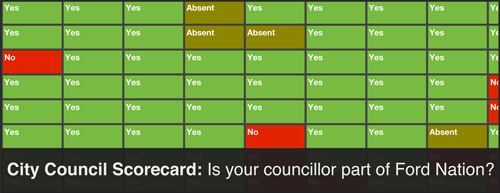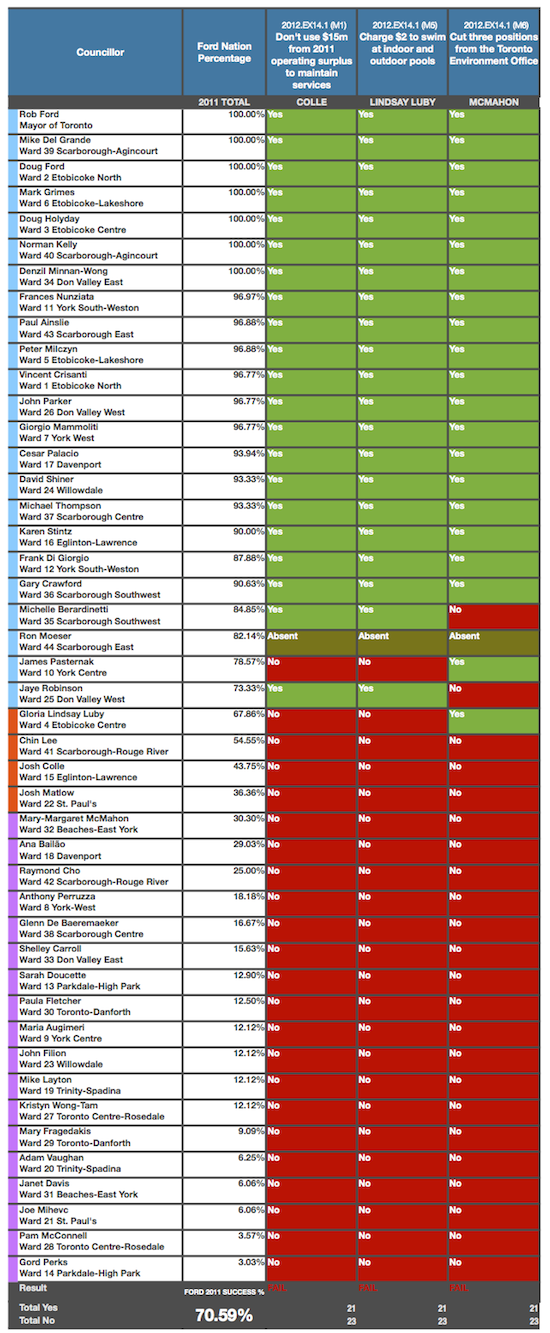March 6, 2012: Google Docs (Best View) - Download (PDF)  - Download (PNG)
Last night, the mayor of Toronto lost control of the city’s biggest budget item. He no longer wields influence over the Toronto Transit Commission.
The new TTC board remains much of the same as the old one: the four councillors who voted not to fire Gary Webster remain in place. Karen Stintz is still chair and Peter Milczyn is likely to be Interim Vice Chair. Joining them will be Josh Colle, Glenn De Baeremaeker and Raymond Cho.
While some will buy into the narrative this happened because of a council opposition that’s drunk with power and bears a personal dislike for the mayor, I have to see it differently: what we saw yesterday was a necessary shift following a series of rejected compromises and aborted deals. A majority of council would have preferred to work within the status quo to achieve the transit direction set out and approved by council in February, but a combination of stubbornness and spite made that impossible.
In addition to being a political body that democratically makes decisions, Council is also responsible for ensuring that those decisions are carried out. To that end, dissolving the existing TTC board and replacing it with one more in tune with council’s approved direction was the only responsible move.
The New Vote
The Vote Added:
The existence of EX16.8 was a stroke of luck for council’s opposition. Had the item not coincidentally appeared on the Executive Committee’s agenda a few weeks ago, Stintz would have been forced to call yet another special council meeting in order to get an item relating to the composition of the TTC board on the agenda. Since this item — it originally was just supposed to add some citizen members to the board — was already due to come before council, councillors were able to piggyback their plans on top of it.
The process worked very similarly to what we saw with the TCHC board a year ago. With a majority vote of 29-15, council dissolved the existing board and kicked off a process to appoint seven councillors onto a replacement board. They also voted to add four citizen members at a later date.
The mayor was ill-prepared to counter this motion. Never has his team looked so disorganized and out-of-their-depth on the council floor. Michael Thompson was chosen as the guy who would move a counter-motion, suggesting that the TTC instead be made up of all citizen members with no representation from councillors. Thompson spoke at length about how this would de-politicize transit planning and provide new expertise to the operations of the TTC.
This lame strategy never had a chance of getting anywhere near majority support. To further complicate matters, Deputy Mayor Doug Holyday and Councillor David Shiner — both Ford-allies — moved their own conflicting motions.
The alternative motions were ultimately irrelevant, as Stintz’s motion to dissolve came before council first and passed by a huge margin. Even stalwarts like Cesar Palacio and Gary Crawford supported it. Giorgio Mammoliti’s thumb barely made an appearance all day. The mayor, it seemed, had given up.
Trend Watch
With her full-term voting percentage dropping below 70%, Councillor Jaye Robinson is now firmly in “mighty middle” territory. She should feel more at home there.
The mayor needs to start finding some common ground with middle-of-the-road stalwarts Josh Matlow and Josh Colle — their voting records lately are looking more lefty and less middle.
It’s important to note that the new TTC board is still heavy with councillors with very Ford-friendly voting records. Despite her recent characterization as a tool of the left, Karen Stintz has voted with Ford 87% of the time. John Parker is a 92% stalwart. Peter Milczyn beats them both at 95%. Of the other four, Josh Colle and Raymond Cho are hardly flag-waving leftists. Under any other circumstance, this would be considered a very balanced board.
Hell, I can prove it mathematically. Average out the full-term Ford Nation scores of the seven councillors on the new TTC board and here’s what you get: 50.3%.
Questions
Questions about the Council Scorecard? Read my notes on methodology. Also, you can email me.




